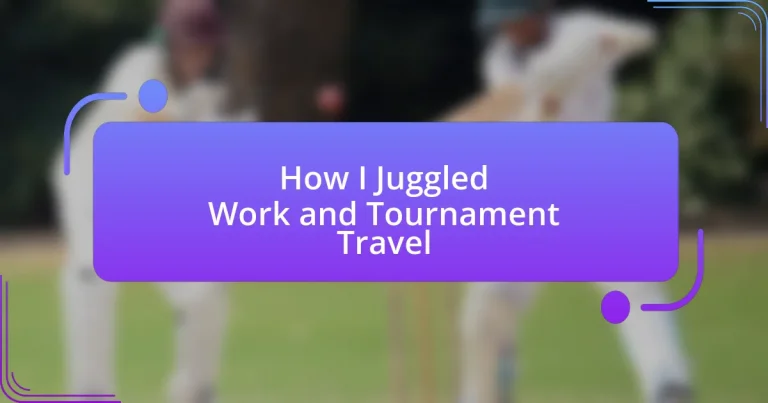Key takeaways:
- Open communication with employers and teams is crucial for creating a flexible work schedule while managing travel commitments.
- Proactive planning and utilizing technology can significantly enhance productivity during travel.
- Adapting to different time zones and prioritizing hydration and light exposure can mitigate jet lag and improve overall well-being.
- Maintaining a detailed packing list and being flexible with travel plans can reduce stress and enhance focus during tournaments.
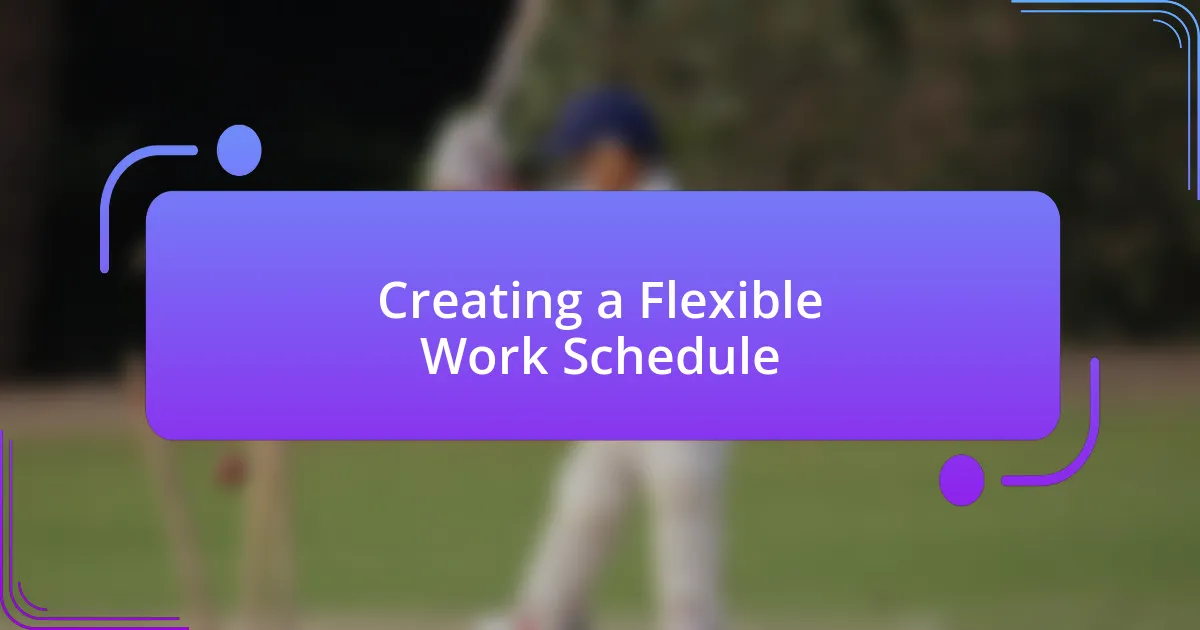
Creating a Flexible Work Schedule
Creating a flexible work schedule starts with open communication with your employer about your needs. I remember a pivotal conversation with my manager where I laid out my travel schedule and proposed working earlier to keep up with project deadlines. The relief in their eyes was palpable; they appreciated my honesty, and it made all the difference in my ability to balance work and travel.
You have to be proactive in structuring your day. When I began this journey, I found that starting my workday at 6 AM allowed me to wrap up before noon, giving me ample time for training or travel. Have you ever found yourself cramming tasks into your day and feeling overwhelmed? I learned that by prioritizing my tasks in the morning, I could achieve more without the evening stress creeping in.
Also, utilizing technology to create a seamless workflow is essential. I’ve relied heavily on project management apps to track my tasks and coordinate with teammates while on the go. It felt empowering to know that, even from a café in a different city, I could stay connected and complete my responsibilities. Isn’t it interesting how technology can bridge the gap between work and the world of tournament travel?
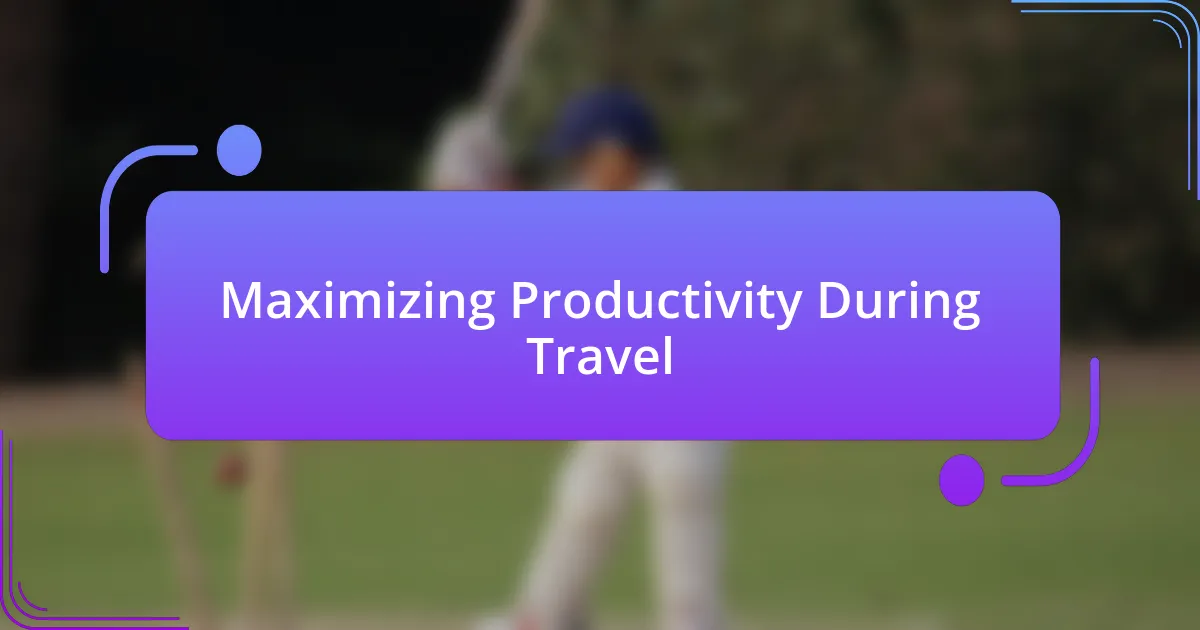
Maximizing Productivity During Travel
Maximizing productivity while traveling can sometimes feel like a juggling act, but I’ve found that planning ahead makes a world of difference. Whenever I hit the road for a tournament, I prioritize creating a task list. This list isn’t just about work; it integrates my travel schedule, ensuring that I capture all essential tasks in one glance. I often jot down quick notes about my ideas during long flights or layovers. There’s something about being in transit that sparks my creativity, and I’ve crafted some of my best strategies while watching clouds float by.
Here are some tactics that have worked for me to maximize my productivity during travel:
- Set Up a Mobile Office: Always carry a portable hotspot or download offline files and documents so that you’re never at the mercy of unreliable Wi-Fi.
- Time Block: Allocate specific blocks of time for work during your trip, even if they are short. I often manage to squeeze in a focused 30 minutes in between training sessions.
- Minimize Distractions: Use noise-canceling headphones to help you concentrate, especially in busy places. I’ve found that tuning out the world can amplify my productivity.
- Leverage Downtime: Instead of scrolling through social media during wait times, I use that time to catch up on emails or brainstorm ideas.
- Stay Organized with Apps: I use digital tools to manage tasks and set reminders, ensuring that I won’t drop the ball on any commitments.
Through this strategy, I’ve discovered that travel doesn’t have to derail my productivity; instead, it can ignite new ideas and invigorate my work approach.
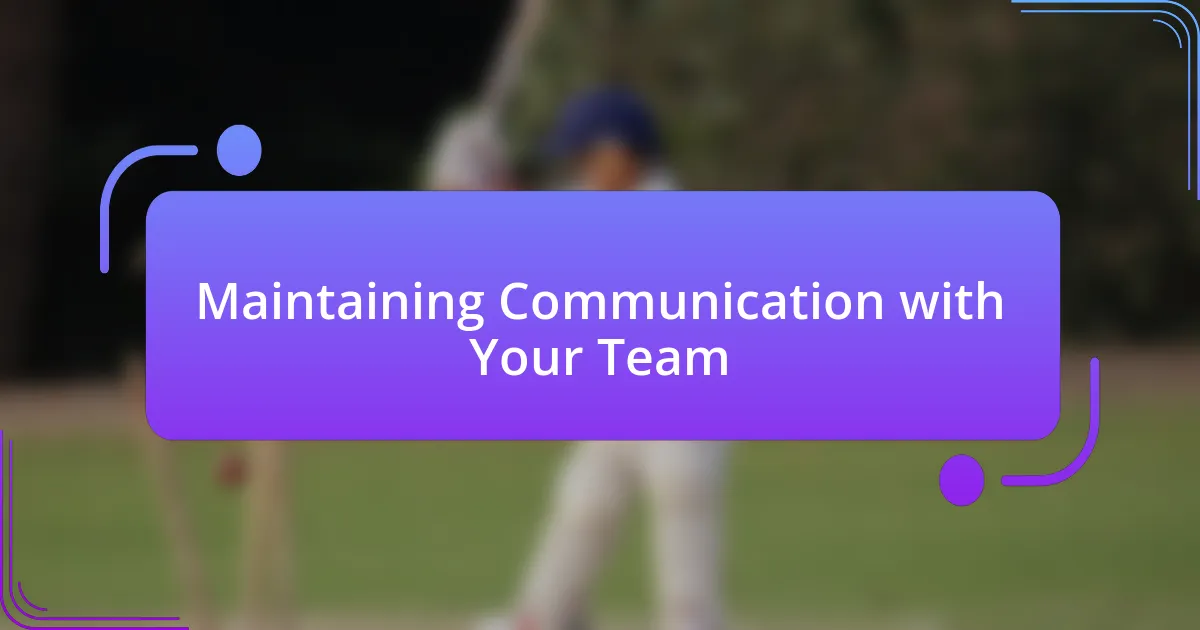
Maintaining Communication with Your Team
Maintaining open lines of communication with my team during tournament travel has become a cornerstone of my success. I’ve learned that regular check-ins are vital, even when I’m far from my usual desk. For instance, I set a specific time each day to update my team on my progress and any obstacles I encounter. This not only keeps everyone on the same page but also fosters a sense of camaraderie, making me feel connected to the office despite the distance.
One method I’ve found particularly effective is using collaborative tools to share updates and ideas in real-time. During a recent tournament, I pulled my phone out in the middle of a busy practice session to drop a quick message about a new strategy I was exploring. The immediate feedback from my team boosted my confidence and allowed me to refine my approach on the spot. This blend of teamwork and communication energizes me, reminding me that I am not alone in this journey.
Flexibility is also key; I’ve had situations where my travel plans changed unexpectedly, and I had to adapt quickly. Keeping an open line via messaging apps meant that I could easily touch base and update progress without missing a beat. It’s about finding that balance between my tournament commitments and ensuring my team feels involved and informed, making the entire experience richer for all of us.
| Method | Benefit |
|---|---|
| Daily Check-ins | Enhances team connectivity |
| Collaborative Tools | Facilitates real-time updates |
| Messaging Apps | Allows for flexibility and quick updates |
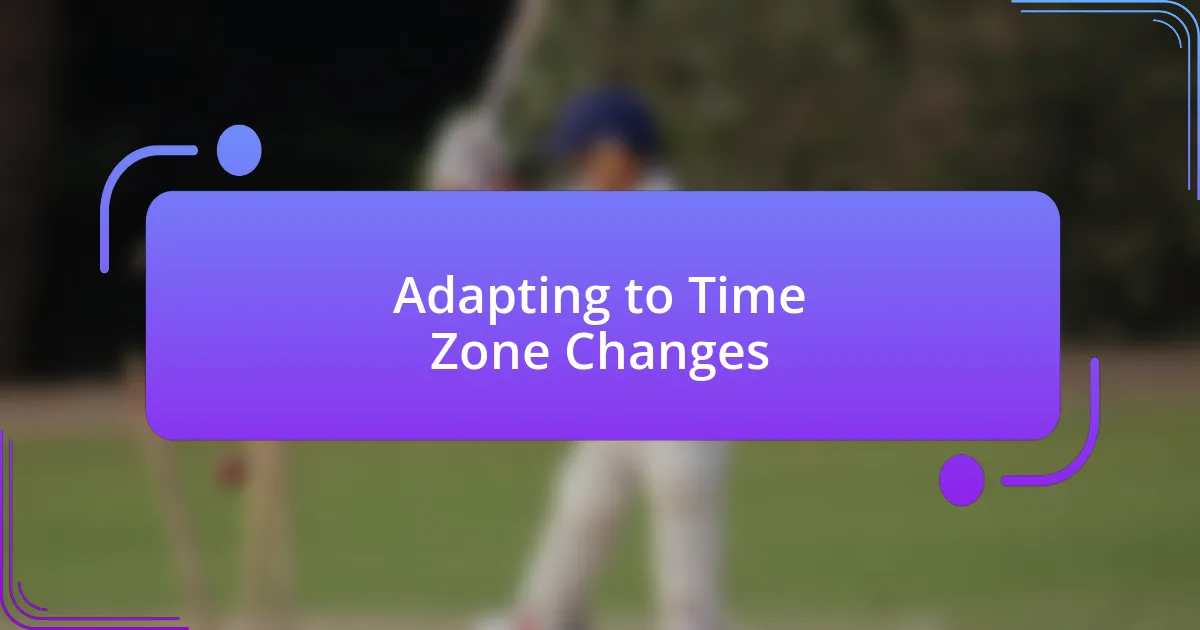
Adapting to Time Zone Changes
Adapting to new time zones can be quite the challenge, especially when my mind and body are still racing from the excitement of a tournament. I remember arriving in a city that was several hours ahead of my usual schedule. It felt like my brain was in a fog, grappling with the reality that it was late afternoon there while my body insisted it was still morning. Have you ever felt that disorientation? I found that taking short naps and adjusting my meal times helped me ease into the new rhythm.
One strategy I’ve come to rely on is gradually shifting my sleep schedule before leaving. A few days before a tournament, I try going to bed and waking up just an hour earlier or later, depending on the destination’s time zone. This small adjustment has significantly diminished that overwhelming jet lag I used to face. The first time I tried it, I noticed I felt more alert during my first practice session. It wasn’t a perfect solution, but it certainly gave me a head start.
An interesting realization for me was the importance of hydration and light exposure in combating time zone fatigue. During a tournament in a particularly sun-soaked locale, I made a conscious effort to stay hydrated and spend time outdoors. The sunlight helped reset my internal clock, and I felt energized, contrary to my previous experiences of struggle. It made me question: Why don’t we prioritize these simple yet impactful strategies more often? Embracing these adjustments can truly enhance not just performance, but overall well-being while traveling.
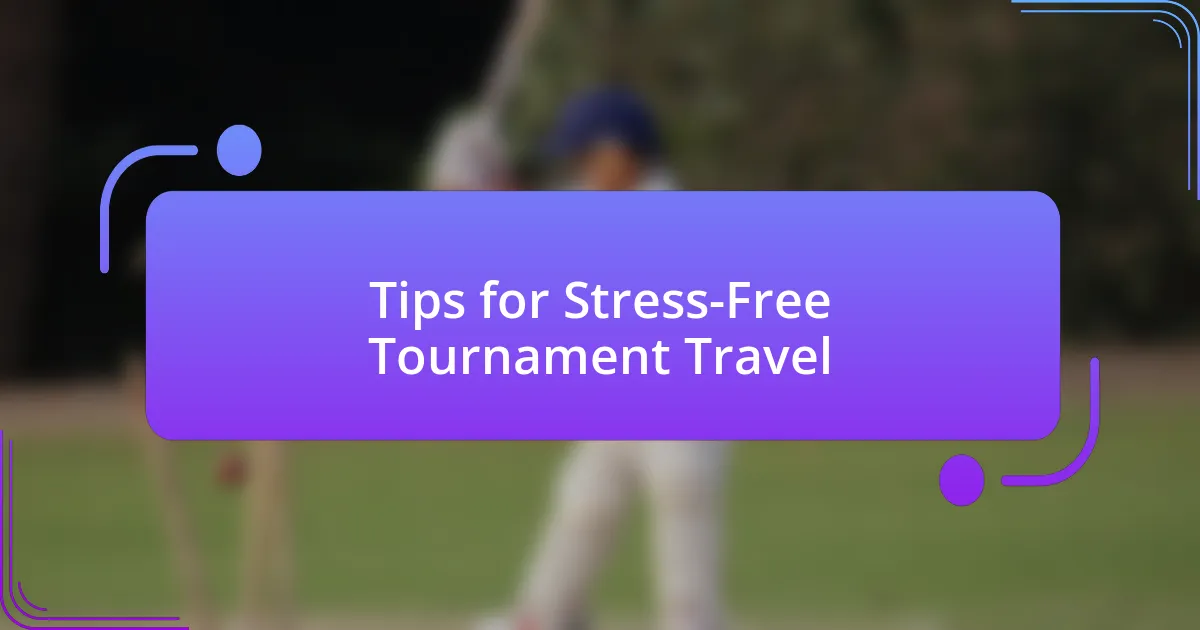
Tips for Stress-Free Tournament Travel
Preparing for tournament travel can often feel daunting, but I’ve found that planning ahead is both a game-changer and a relief. I always create a detailed packing list a week before the trip to ensure that I don’t rush at the last minute. There was one time when I forgot my favorite pair of shoes and ended up with blisters from ill-fitting alternatives. Ever experienced that moment of panic when you can’t find something crucial? By checking items off the list early, I lower my stress and make the packing experience much smoother.
During my travels, I prioritize flexibility in my schedule. Once, I was faced with an unexpected delay on my return journey, which could have thrown off my game preparation. Instead of panicking, I adjusted my schedule to include a light workout and a review of my notes while waiting. It really highlighted how adapting to unforeseen circumstances can actually enhance my focus and preparedness. Could embracing unpredictability become one of our strongest allies?
Communication is another key element in ensuring my tournament travels are stress-free. I always keep my coach and teammates informed about my travel plans and any changes. There was a time when I had to reroute my trip due to a last-minute flight change, and I quickly updated everyone, ensuring that we were all on the same page. This connection minimizes confusion and creates a supportive network, allowing us to navigate unexpected challenges together. Have you considered how open communication can ease not just your travels but also strengthen team dynamics?












